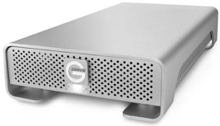 When does a Google app cross the line between being a brilliant innovation and purely an invasion of privacy? Many people, including myself, probably trust Google’s servers more than their own hard drive backups but does that mean that we should continue to flock like sheep to apps like Google Docs and Gmail which store huge amounts of private data? Google latest work in progress, the GDrive, has added a new dimension to the debate as it promises to revolutionise the way we view PCs. The GDrive will be a Web 2.0 app/online storage solution that means your machine will be viewed as simply an interface through which to access all your applications and data online. In other words, the machine will no longer be the star of the show.
When does a Google app cross the line between being a brilliant innovation and purely an invasion of privacy? Many people, including myself, probably trust Google’s servers more than their own hard drive backups but does that mean that we should continue to flock like sheep to apps like Google Docs and Gmail which store huge amounts of private data? Google latest work in progress, the GDrive, has added a new dimension to the debate as it promises to revolutionise the way we view PCs. The GDrive will be a Web 2.0 app/online storage solution that means your machine will be viewed as simply an interface through which to access all your applications and data online. In other words, the machine will no longer be the star of the show.
Technology site TGDaily reports that the GDrive will be released at some time later this year predicting that:
Gdrive will likely cause a major paradigm shift in how we use computers and bring Google one step closer to dethroning Windows on your desktop.
GDrive is of course simply a progression of “cloud computing” that transfers processing power from the PCs to web servers. The Guardian defines the future of a PC linked to GDrive as:
A simpler, cheaper device acting as a portal to the web, perhaps via an adaptation of Google’s operating system for mobile phones, Android. Users would think of their computer as software rather than hardware.
Anything more specific than that at the moment is hard to say although TGDaily reveal a little more detail on what it should look like:
Gdrive is basically a cloud-based storage that should have two faces: A desktop client that keeps local and online files and folders in two-directional sync via a web interface for accessing your desktop files anywhere and anytime, using any network-enabled computer. In addition, it will come tightly integrated with other Google services to enable editing of supported document types, like spreadsheets and presentations via Google Docs, email via Gmail, images via Picasa Web Albums, etc.
The possibilities this offers are undeniably exciting if nothing new. It means that rather than having hard copies of documents that are out of sync with your online documents, once they are updated online, they will be automatically updated on your hard drive without you needing to lift a finger. This surely raises the issue though whether it will be even worth editing anything on your hard drive anymore other than to have a hard-copy backup. The bigger and more obvious question however surrounds personal privacy which has already got civil liberties groups such as The Free Software Foundation up in arms. Executive Director told The Guardian:
It’s a little bit like saying, ‘we’re in a dictatorship, the trains are running on time’. Does it matter to you that someone can see everything on your computer? Does it matter that Google can be subpoenaed at any time to hand over all your data to the American government?
As I wrote a while back too, other critics such as GNU founder Richard Stallman describe the entire cloud-computing movement as “worse than stupidity”.
Dave Armstrong of Google Enterprise however rejects such notions claiming that Google are simply bending to the demands of consumers:
There’s a clear direction … away from people thinking, ‘This is my PC, this is my hard drive,’ to ‘This is how I interact with information, this is how I interact with the web.
Armstrong is of course right – ask most people what they use their PC for and it will be web based activities such as e-mailing, social networking, reading, multimedia and online gaming rather than using any particular application they have installed. The fact is, we’ve already gone a hell of a long way down the road of online storage and web interaction to turn back now. There is nothing wrong with concepts such as the GDrive as long as their role is clearly defined i.e. that they can only access those parts of your hard drive that you allow them to.
The most important factor however is your own discretion. It goes without saying that anything that is particularly sensitive or private should not be stored on something such as GDrive for your own peace of mind. However, with PCs relatively easy to hijack, the truth is GDrive or no GDRive, there are few safe places for you to store data on a machine with a connection to the net.
There’s only one thing for it then – buy a Mac 😉

